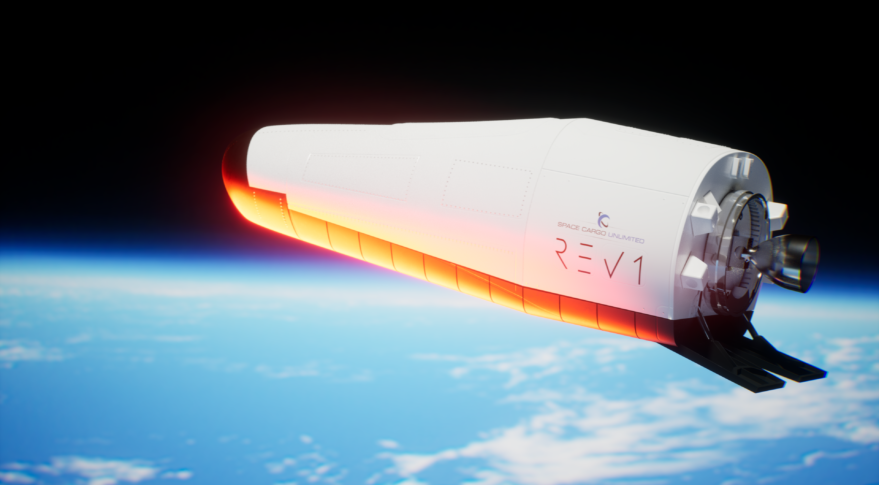30.12.2022

Thales Alenia Space is designing REV1 to spend several months in orbit before returning to Earth. Credit: Space Cargo Unlimited
TAMPA, Fla. — Uncrewed rather than crewed spacecraft will be key to realizing an emerging in-orbit manufacturing industry, according to a European venture that has tasked Thales Alenia Space to develop a vehicle called REV1 for missions starting in late 2025.
Thales Alenia Space signed a first phase contract for the REV1 reusable and pressurized “space factory” in early December with REV, an eight-year-old Luxembourg-based venture seeking funds to develop a microgravity research and manufacturing business.
While Texas-based Axiom Space closes in on a sizable investment round to develop a crewed commercial space station, Space Cargo Unlimited says an uncrewed system like REV1 could be more flexible and cheaper by avoiding the numerous safety measures needed to support human activities.
“Safety measures on space stations will rightfully always protect human lives to the detriments of the payload at stake,” Space Cargo Unlimited CEO and co-founder Nicolas Gaume told SpaceNews.
“To scale in-space manufacturing, we do not believe in multipurpose vehicles with humans on board,” Gaume added. “In fact, we believe that the approach to in-space manufacturing should be driven from the payload, not the vehicle.”
Thales Alenia Space is responsible for designing, engineering, and developing REV1, which is about the size of a compact car and would be owned and operated commercially by Space Cargo Unlimited.
The first phase contract gets Space Cargo Unlimited up “to the ability to start manufacturing,” a spokesperson for the venture said.
REV1 is being designed to carry up to 1,000 kilograms of payload for several months in low Earth orbit, where it would dock with a Reusable Orbiting Service Module that Thales Alenia Space is also developing.
This service module would have solar panels and electric thrusters to remain in orbit for about 10 years, according to Gaume, or roughly 20 REV-1 missions.
After completing its mission, a heat shield fitted to REV1 would enable it to reenter Earth’s atmosphere for a parachute-assisted landing.
Target markets include biotechnology, pharmaceuticals, and manufacturers looking to develop new materials from space.
REV1 has “a number of exciting in-space manufacturing payloads from defining customers we will be unveiling as we get closer to launch,” Gaume said.
The spacecraft would also assist agricultural experiments the venture has already been facilitating on the International Space Station for growing vines and maturing wine in microgravity.
Gaume said REV1 has lined up “a number of” other in-orbit development and validation projects, including test beds for propulsion systems.
“The first case for the failure of satellites lies with their propulsion systems,” he said via email. “And if you think about it most of the satellite’s propulsion systems are not tested in Space, and when they are, they do not come back, increasing dramatically the cost and timing of developing a new system.
“By opening the possibility to test rapidly and return, we accelerate and support the whole Space ecosystem.”
Space Cargo Unlimited and Thales Alenia Space hope to build a “space garage” in Turin, Italy, for maintaining, repairing, and overhauling REV1 and other spacecraft.
European private equity firm Eurazeo is Space Cargo Unlimited’s main financial backer and is a shareholder.
Space Cargo Unlimited said it has also secured investments from Thales’ venture capital arm and European early-stage investor Geodesic for its plans.
Other companies developing uncrewed spacecraft for in-orbit manufacturing and other applications include Space Forge, a British startup planning to launch its first satellite on Virgin Orbit’s inaugural mission from the United Kingdom early next year.
Quelle: SN

